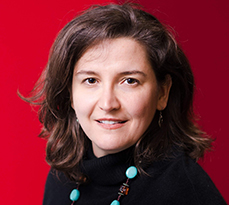Paper on resolving work practice differences in a merger by Dr Karla Sayegh of Cambridge Judge Business School wins two top awards and a runner-up honour at the annual meeting of the Academy of Management.
A study on how health care professionals can settle differences in their ways of working amidst major change, authored by Dr Karla Sayegh, Assistant Professor in Organisation Theory & Information Systems at Cambridge Judge Business School, won two top awards and also the second-place honour as the very best dissertation paper at the annual meeting of the Academy of Management.

The study examines how the work of expert groups from separate organisations but from the same profession can be brought together and integrated to ensure reliable, high-quality performance. The study focuses on the merger of two neonatal intensive care units (NICUs) in teaching hospitals, which face critical life-or-death issues affecting infants.
The study – entitled “Of novices and experts: settling expertise differences following a hospital merger” – won the Best Paper award of the Healthcare Management Division of the Academy of Management at the group’s annual meeting last month in Seattle. This award is sponsored by the American College of Healthcare Executives and carries a cash award.
A rare double win from the Academy of Management
Karla also won the Healthcare Management Division award for Outstanding Paper Based on a Dissertation, as the study was the basis of her 2020 dissertation for a PhD in Strategy and Organisation from McGill University in Montreal. The award sponsored by the Association of University Programs in Health Administration must be sole authored, and it also comes with a cash award. It is uncommon for the same recipient to win both this award and the Best Paper award from the Healthcare Management Division.
In addition, Karla was honoured in the Academy of Management’s All-Academy awards as the only runner-up for the William H. Newman Award, which recognises the best annual meeting papers based on a doctoral dissertation completed within the past three years. Each of the Academy’s many divisions and interest groups can nominate one submission for this award.
The prize-winning study breaks new ground in its examination of expertise integration in professions/occupations.
Previous research had largely focused on the integration of expertise across occupational communities (such as how architects interact with engineers), assuming that within-occupation integration was less problematic because expert groups share similar formal training and common ways of approaching problems.
“Yet, our tracing of expert practices before and well after the merger of two NICU units suggests that within-occupation settlement processes can be protracted and complex.”
Newcomers help veterans settle differences
The paper also finds that new members of a profession can help neutralise turf battles among veterans in the event of a big change such as a merger.
“In settling differences, an unexpected finding is that novices, despite their low power and status, can play an important role in challenging differences and triggering an expertise settlement process that ultimately alters the practices performed by their seasoned counterparts,” the study says. “Their actions can effectively enhance an organisation’s ability to improve expert practices in the context of a merger.
“Successfully standardising practice also may entail the enactment of rules that reflect best practices and accepted scientific evidence in the occupation’s explicit body of knowledge. However, while scientific knowledge provides a foundation for settling differences, experts often push back against rules because working to them diverges from the tacit, intuitive ways by which experts perform their work. Therefore, managers may need a complex repertoire of interventions to facilitate practice convergence, but in the process, ironically, experts may have to relinquish valuable work autonomy and judgement and regress to working according to rules, much as novices do in their quest to become an expert.”
Life-or-death work in hospitals sparked study
Karla says she became interested in this topic when she was given access to the hospitals and to the unique opportunity to live among the experts as they go about doing life-or-death work on sick babies.
In her words: “Their work is already fraught with uncertainty – a sick baby’s condition might deteriorate at any moment for reasons that are hard to diagnose. If you add to that major organisational upheaval, what could possibly be more interesting and meaningful to study for an organisational scholar?”
The study
The paper in Academy of Management, “Of novices and experts: settling expertise differences following a hospital merger”, is by authored by Dr Karla Sayegh, Assistant Professor in Organisation Theory & Information Systems at Cambridge Judge Business School.


